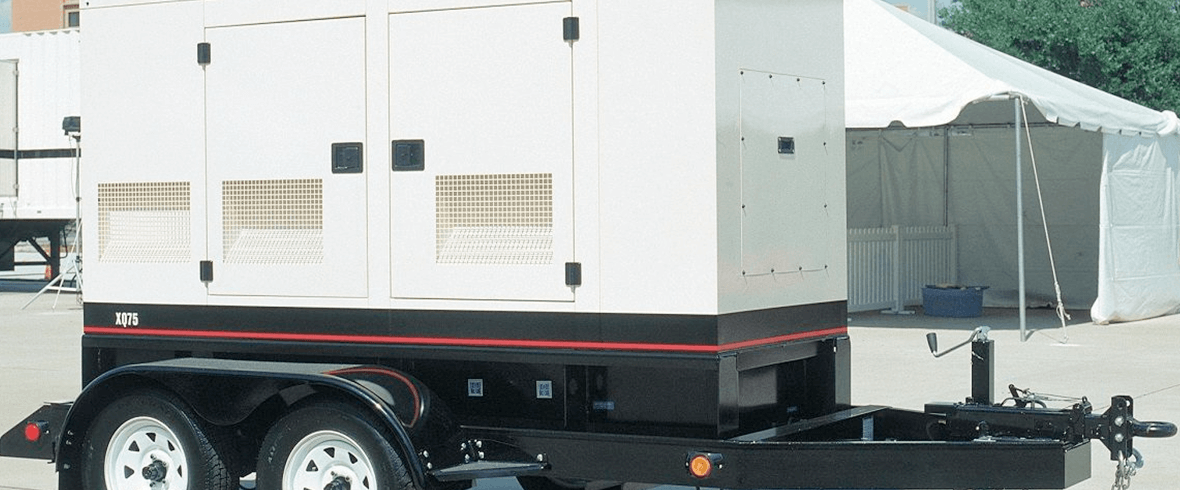
What You Need to Know When Renting a Generator
Power is everything on a job site. Without it, your tools and equipment that rely on an external power source will quickly grind to a halt — and so will your productivity. For many jobs, power generator rentals are the answer when contractors need an extra source of power or a backup solution when their primary generators are down for servicing.
With so much riding on the reliable performance of generators on job sites, no one can afford to have a bad experience while renting one. That’s why our team at The Cat® Rental Store has put together the following guide to what you need to know when renting a generator.
Browse our tips for renting generators and discover what’s most important to consider when renting a generator, including the type of power, performance and value that contributes to the quick and quality completion of every job you undertake.
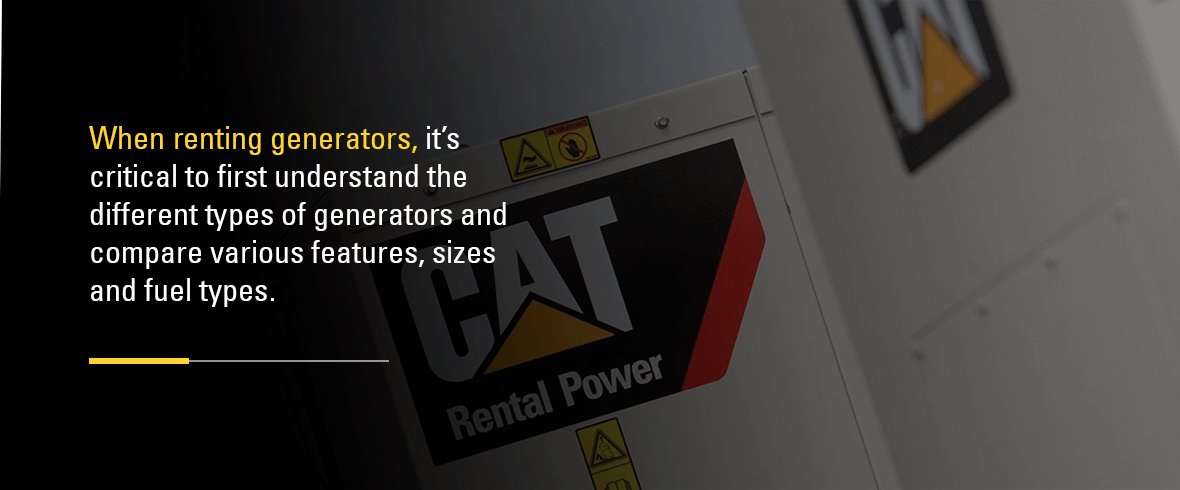
Types of Generators
When renting generators, it’s critical to first understand the different types of generators and compare various features, sizes and fuel types. Each type of generator has its unique advantages along with some drawbacks you need to be aware of before choosing a model. Certain types of generators are more suitable for specific applications, so keep in mind how you plan to use your generator when reviewing the different options.
Below are four types of generators:
1. Diesel Generators
By far the most common type of generator is the diesel-powered generator. Due to their broad availability, fast startup, affordable pricing and wide availability of fuel, diesel generators are the unit of choice on construction sites, at events and for dozens of other industrial or commercial purposes.
Despite these clear advantages, previous generations of diesel generators were thought to have some important disadvantages. Diesel units have been traditionally hard to maintain, noisy and unreliable in cold weather. Today’s diesel generators are more reliable and cost-effective to maintain, and they’re much less noisy than they were previously.
If you’re considering renting a diesel generator, some of the benefits to consider include:
- Fuel-efficient: Diesel generators are capable of powering high loads using a limited amount of fuel.
- Durability: Diesel generators are built for rugged environments and can withstand heavy wear and tear.
- Fuel accessibility: Diesel is a broadly available fuel source, making it convenient to operate long-term.
One of the main drawbacks of diesel generators is the amount of pollution they produce, making them unsafe to operate indoors or in enclosed spaces.
2. Natural Gas Generators
While diesel generators are more common and are the traditional fuel type of external power units, natural gas is becoming increasingly more popular thanks to its several advantages.
As of January 2020, there's an estimated 464 trillion cubic feet of natural gas in reserve in the United States. With over 3 million miles of natural gas pipeline making up a vast distribution network, the fuel commodity is readily available and accessible for consumption across the country.
When it comes to fueling backup power, natural gas provides the following benefits:
- Cost-effective: Natural gas is significantly cheaper than diesel.
- Convenient: There's no need to maintain fuel tanks or take precautions to prevent degradation.
- Safe: There's no risk of fuel spills and environmental hazards.
- Clean: Compared to diesel, natural gas burns cleaner and with less air pollution.
- Easy installation: It's easy to install and set up in tight spaces, on rooftops or in other areas where diesel fuel servicing would be difficult.
Despite the above benefits of natural gas, the tradeoff is that natural gas-powered generators are typically more expensive than diesel models.
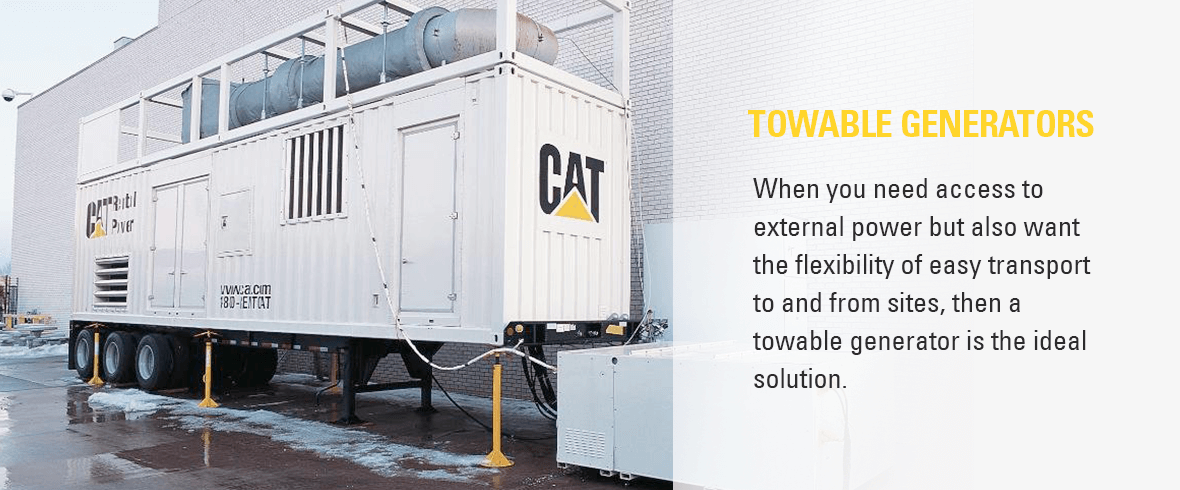
3. Towable Generators
When you need access to external power but also want the flexibility of easy transport to and from sites, then a towable generator is the ideal solution. Towable generators, also called trailer-mounted generators, are perfect for semi-permanent situations, such as construction sites, mining operations, military bases and short-term applications.
Towable generators are mounted on a trailer and designed to hitch to the rear of a truck, ready to be hauled for maximum mobility. Compared to smaller generator units, towable generators tend to offer higher output capacity.
Because they typically have larger fuel tanks, towable generators can supply more power for longer, making them perfect for demanding applications. Most towable generators are diesel-fueled, though some gasoline and propane models are available, as well.
4. Large Generators
For industrial applications that need a steady stream of power for several devices, lightning units, tools and more, having large generators on site can guarantee a seamless operation. Large generators are those that have higher power output capacities — typically ranging from 500 kilowatts to 1,000 kilowatts or more.
Large generators can be powered by a variety of fuel types from diesel to gasoline to propane. Many large generators are also towable, making them a convenient solution for applications that need high power output along with the flexibility of being mobile.
Generator Applications
Virtually every setting in our society today relies on power to run successfully. As a result, portable generators have numerous applications. Whether there’s a large or small risk of power interruption, a generator is always a wise investment.
Below are a few of the scenarios where generators are used:
- Construction sites: Construction sites are one of the most common places to find a generator. Construction sites typically don’t have active electrical infrastructure hooked up, or it’s not available for contractor use. Having a generator provides either primary or backup power to supply electrical tools and equipment with a steady stream of reliable power.
- Routine shutdowns and outages: When industrial facilities, like mines, mills or factories, undergo routine shutdowns or planned power outages, having a backup power supply is essential to keep basic operations up and running. Backup power at these facilities is necessary for the health and safety of all on-site workers.
- Hospitals: Hospitals and clinics rely on unfettered access to electricity to power their equipment, computers and lighting. Every hospital needs a backup power supply in the event of a power outage or emergency. When grid power is unreliable in certain locations, having the ability to quickly rent a backup generator is vital.
- Agriculture: Whether you need a generator as a primary or backup source of power, farmers and ranchers know how critical it is to have access to an independent electrical supply to provide power for barn and stable heaters, lighting and other equipment. Generators are also important for applications like fish farming, irrigation and other electrically powered pumps and systems.
- Hospitality: The hospitality industry is another specialized area of service that requires ongoing access to power. During storms or other events that make power unreliable, hotel and restaurant owners can rest assured their customers will be taken care of with a power generator.
- Concerts, festivals and events: If you’re hosting an event, you know how critical it is to power your sound and lighting equipment, refrigeration equipment for concession and other important devices so your guests can enjoy themselves. From fairs and carnivals to sporting events and conferences, portable power generators are essential to running a successful event.
It’s vital to consider your unique application when choosing the right type of generator for your needs, including deciding on the right fuel source and size.
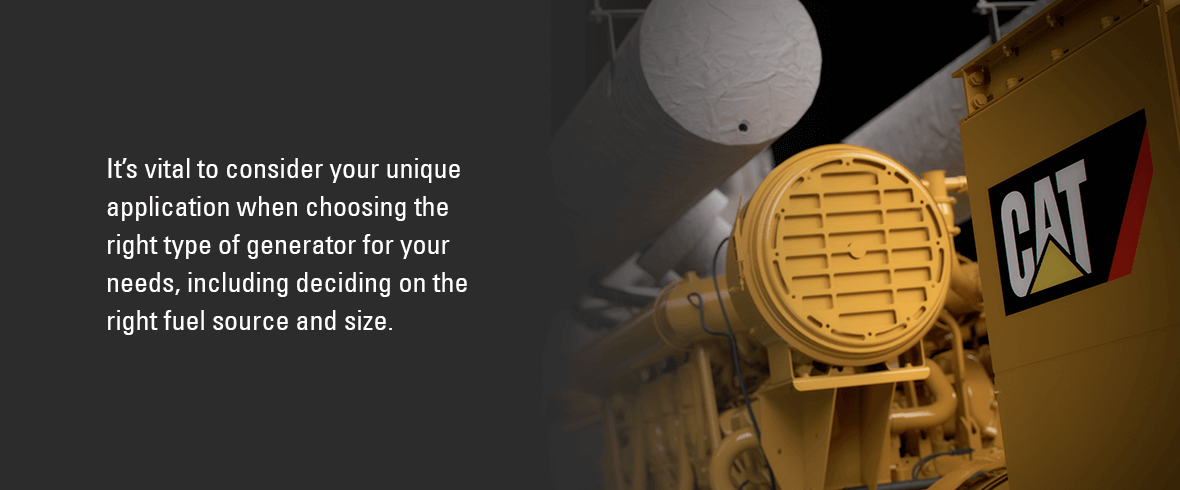
10 Tips for Renting Generators
Generating power from an internal combustion engine to spin a core located within a coil — resulting in electricity produced from the magnetic field — sounds like a simple enough process. However, when you realize you have to determine the power load you’ll need, the equipment you’ll be running and the conditions it’ll be expected to perform under, your decision can become a bit more complicated.
The following tips on what to consider when renting a generator can help you decide on the right model and protect yourself when partnering with a reputable and reliable rental provider.
1. Select a Reliable Name Brand and Trusted Rental Partner
In addition to there being a wide variety of types and sizes of generators, there are also many brands to choose from. As one of the leading manufacturers of portable generators and power supply equipment, Caterpillar offers numerous types, sizes and configurations of generators.
When choosing the right generator for you, it’s critical to choose a name brand you can trust and work with a reliable rental company. The Cat Rental Store offers vast expertise in helping customers make the right choice for their power needs.
2. Read the Rental Agreement Carefully
When choosing a company to rent your generator from, it’s important to ask to review the provider’s rental agreement. Be sure to read over the rental agreement before signing.
Some of the points to consider when reviewing an equipment rental agreement include:
- Rental fees: Look for possible hidden fees or financial penalties.
- Liability insurance: Determine whether you're responsible for obtaining separate insurance.
- Rental term: Be aware of your responsibility to return the equipment at a specific date and time.
Transparent rental agreements — like the ones we employ at The Cat Rental Store — are a sure sign you’re dealing with a reputable rental company.
3. Choose the Right Generator for Your Load Requirements
The size of generator you need is one of the most important factors when selecting the right unit. Before renting your generator, you need to first calculate the correct capacity based on how much power you intend to consume.
Getting the right size generator is an important matter of safety to ensure you have enough power when you need it and prevent overloading the unit. If you’re not sure how to calculate the size of generator you need, ask for assistance from your rental specialist.
4. Be Sure That It’s Tested
When approaching your rental provider about renting a generator, it’s essential to ask about how recently the equipment was tested. Responsible rental companies will have protocols for pre- and post-rental inspections.
Because we carefully inspect all of our rental equipment prior to check-out and after check-in, you can be assured of the quality of rental generators at The Cat Rental Store.
5. Be Sure That It’s Clean
In addition to ensuring the rental equipment is working properly, it’s crucial that the generator is sufficiently cleaned and maintained. Since you’ll likely be responsible for the condition of the generator when you return it, only accept a generator that’s clean and looks well-maintained.
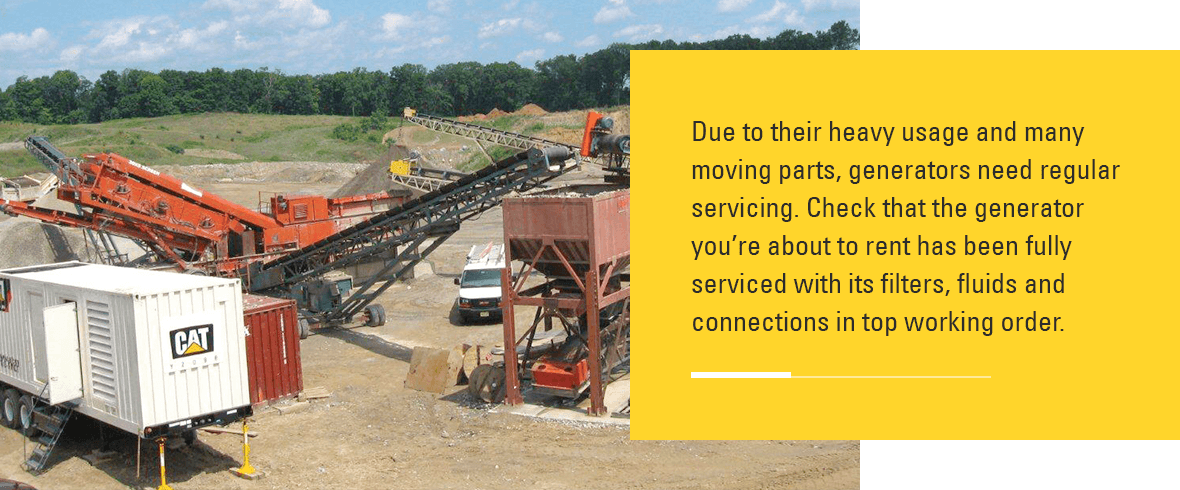
6. Check That It’s Serviced
Due to their heavy usage and many moving parts, generators need regular servicing. Check that the generator you’re about to rent has been fully serviced with its filters, fluids and connections in top working order.
7. Figure out Transport
When reviewing your rental agreement, verify whether you or the rental company will be responsible for the delivery and return of the generator. If you’ll be transporting it, be sure you have the right trailer hitch for the job.
8. Check the Weather
Variables like inclement weather and changes to your project’s scope can impact when you need your rental equipment. Always keep an eye on the weather report, and be sure to inform your rental company of any changes to the parameters of your rental schedule.
9. Operate According to Instructions
When renting equipment, it’s vital to know that you’ll be responsible for operating the generator safely. Familiarize yourself with the proper operating instructions for the generator and follow them accordingly. Factors like running it outside to prevent toxic carbon monoxide buildup and not refueling a hot engine are important for the safety of your crew and the equipment.
If you feel you need support, ask for instructions, training and even a demo.
10. Ground the Generator
You don’t have to be a professional electrician to know that it’s imperative to properly ground your generator before usage. If you don’t, you run the risk of short circuits, tripped breakers and other unwanted electrical issues occurring.
Benefits of Renting Generators
Generators are vital pieces of equipment for all businesses to have on-site when needed. Whether you need a backup generator in a pinch, find yourself looking for a replacement generator or want to try out different types before purchasing one, generator rentals can be the ideal solution in many scenarios.
The following are the top benefits of renting generators:
- Flexible rental terms: With a rental contract, you get to choose how long you need the equipment. With flexible rental terms, you only pay for how long you use the generator. Whether you need it for a weekend festival or a six-month construction contract, generator rentals give you the versatility you need to accommodate your business.
- Cost-savings: Generator rentals provide immediate cost savings. With one convenient rental fee, you know exactly what you’re paying for upfront without having to worry about investing your own capital for financing. There are a host of other costs that you forego when you rent a generator, including maintenance and repairs, storage, insurance and other carrying costs.
- Variety of availability: When you approach a rental provider like The Cat Rental Store, you’ll be met with a wide inventory of generators. Having so many options available ensures you don’t get stuck making due with the closest model to your preferred generator. Instead, you can get the right size and features for your unique project.
- Expert advice and field service: While many types of rental equipment are easy enough to operate, generators require a bit of expertise to install properly and ensure they’re working consistently. When you rent a generator from The Cat Rental Store, you’ll get expert advice on how to properly install your generator, including the correct location and positioning of the unit. You’ll also benefit from field service in the event of a malfunctioning unit or a concern about how the machine runs.
- No maintenance: All equipment rentals come with one outstanding benefit — not having to concern yourself with maintenance. By renting a generator from a reliable provider, you’re guaranteed a properly functioning unit that’s been well-maintained and serviced consistently. If anything does go wrong, the repair is included in the rental contract. If it requires lengthy servicing, you’ll be set up with a replacement unit to minimize downtime costs.
- Immediate disaster response: In scenarios where you need a generator due to an emergency situation such as a sudden flood or power outage, equipment rentals make generators available immediately. Having access to on-demand equipment is a highly valuable benefit in emergency situations by saving your business time and money and protecting the safety of all personnel.
- Try before you buy: If you’re thinking of investing in a permanent generator solution for your business, consider renting a unit first. When you try before you buy, you’re able to identify exactly what you need and what you don’t need in a generator, helping you narrow down your options before making a big investment.
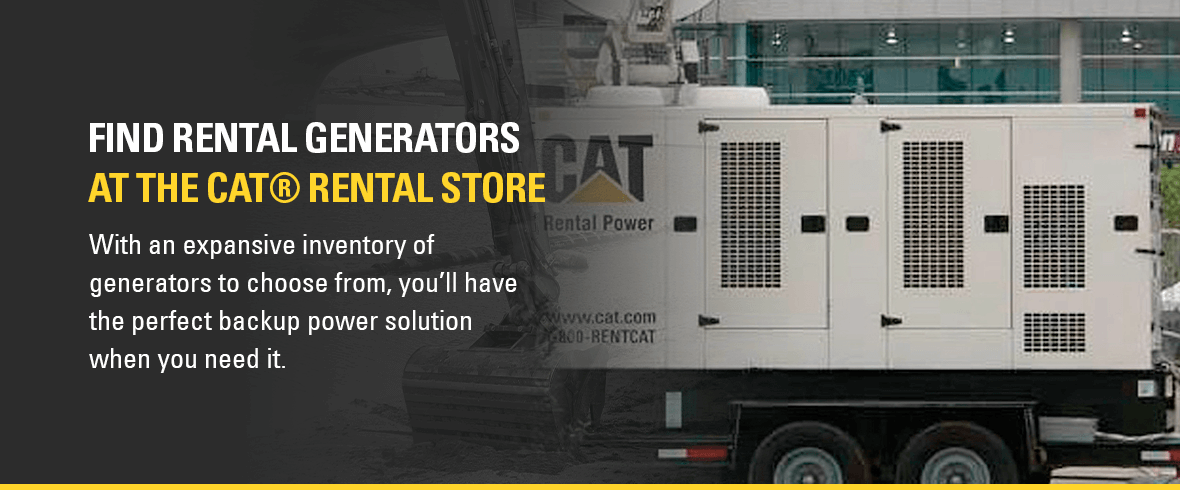
Find Rental Generators at The Cat® Rental Store
When renting a generator makes smart business sense, the next choice to make is which rental provider to partner with. At The Cat Rental Store, you’ll find high-quality, well-maintained and reliable generator rentals.
With an expansive inventory of generators to choose from, you’ll have the perfect backup power solution when you need it. Thanks to our experienced rental equipment representatives, you’ll be confident in your equipment selection and operation throughout your rental term.
Learn about our rental opportunities today by calling 1-800-RENT-CAT or browse our equipment online and rent whatever you need from people who do whatever it takes.
Find The Cat Rental Store Near You